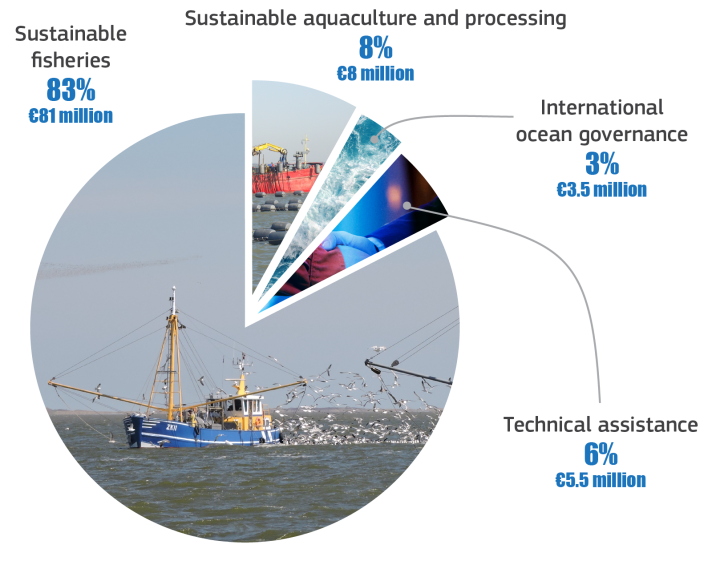The Netherlands will receive €98 million from the European Maritime, Fisheries and Aquaculture Fund 2021-2027
Following the adoptionSearch for available translations of the preceding linkof the Partnership Agreement 2021-2027 with the Netherlands, the Commission has adopted the European Maritime, Fisheries and Aquaculture FundSearch for available translations of the preceding link(EMFAF) programme for the Netherlands, to implement the EU common fisheries policySearch for available translations of the preceding link (CFP) and EU policy priorities outlined in the European Green DealSearch for available translations of the preceding link. The total financial allocation for the Dutch programme 2021-2027 is €139.9 million, of which the EU contribution accounts for €97.9 million.
Commissioner for Environment, Oceans and Fisheries, Virginijus Sinkevičius, said:
I am delighted to announce the adoption of the EMFAF programme for the Netherlands. The programme has a strong focus on innovation aiming towards green transition, energy efficiency, and CO2 reduction, consisting of technological research in cooperation between the sector and knowledge centres. The programme will promote more sustainable and resilient fisheries, aquaculture and processing sectors in the Netherlands.
Supported activities
The Netherlands aims at achieving a maximum added value and has therefore chosen to support a limited number of activity types. 83% of the programme allocation will be dedicated to sustainable fisheries and conservation of aquatic biological resources, 8% will be invested in sustainable aquaculture and in processing and marketing, and 3% will be invested in the strengthening of international ocean governance, all contributing to the EU’s environmental and climate objectives.
The programme will support, among other things:
- Sustainable fisheries: energy efficiency and decarbonisation of fishing vessels; investments to improve the quality of fishery products; investments in fishing vessels to improve safety and working conditions on board; funding for training of the crew for small-scale fisheries; investments to comply with the landing obligation and to improve data collection; research and development of measures and techniques to protect species and habitats.
- Sustainable aquaculture: innovation, research, and investments in sustainable aquaculture and processing; energy efficiency and decarbonisation in aquaculture and the processing sector.
- International ocean governance: strengthening sustainable sea and ocean management through the promotion of marine knowledge, by generating data and knowledge for the implementation of European policy frameworks on the protection of the marine environment and for the North Sea Agreement research programme.

Main expected outcomes until 2027
The Dutch EMFAF programme will contribute to the EU policy priorities outlined in the European Green DealSearch for available translations of the preceding link, Farm to ForkSearch for available translations of the preceding link and BiodiversitySearch for available translations of the preceding link strategies.
The programme will support the resilience of the fisheries and aquaculture sectors, through a strong focus on innovation and knowledge development and sharing. It also allows for temporary cessation support in case of natural disasters, environmental incidents or health crises and emergency support for businesses in case of market disruption.
The programme will support the green transition of the sector with investments aimed at improving gear selectivity, decarbonisation and energy efficiency and engine replacement. Based on the budget allocations, the programme contributions to fight climate change and protect the environment represent respectively 81% and 94% of the total EU allocation, which is well above the 30% target for climate contribution set in the EMFAF Regulation. The contribution of the programme to biodiversity amounts to 69%.
The digital transition of the Dutch fisheries, aquaculture and processing sectors is a key area of the programme: it includes a wide range of innovative solutions from means of control and collection of fisheries data to new IT technologies focusing, for instance, on traceability and transparency through digitalisation of the supply chain information system.
The programme will also support research and the development of measures to improve the management of marine protected areas as well as actions to fight marine litter. The programme will reinforce the environmental actions undertaken under the Dutch prioritised action framework for Natura 2000:monitoring of marine and maritime habitats and species and promotion of scientific knowledge, in line with the EU’s BirdsSearch for available translations of the preceding linkand HabitatsSearch for available translations of the preceding link Directives.
Background
The EMFAF runs from 2021 to 2027 and supports the EU common fisheries policy (CFP), the EU maritime policy and the EU agenda for international ocean governance. The fund helps achieve sustainable fisheries and conserve marine biological resources.
Article 8 of the EMFAF Regulation (EU) 2021/1139 requires Member States to produce a national implementation programme for the EMFAF. This programme focuses on EU priorities, laying down the strategy and investment priorities, including the indicative annual financial allocation for each priority. The programme is subject to approval by the European Commission.
